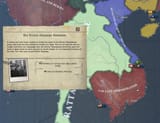Search Results
6/19/2025, 1:09:39 AM
Hold the Thin Red Line
April 14, 1934
The war in Vietnam has advanced into its second year with no end in sight. What Whitehall first dismissed as a minor annoyance has since become a quagmire of alarming scale.
The Vietnamese insurrection, led by Phan Boi Chau and his movement Duy Tan Hoi (Modernization Association), has shocked London with the movement's ability to perservere despite the whole of the Far East Administration being set upon them. The war began outside Hanoi, with the Vietnamese forces pushing the colonial Empire troops south, past the supply point at Da Nang, causing immense alarm in Saigon.
London has rejected offers for peace from Phan Boi Chau, and Prime Minister Rootha Linton-Orman has vowed to send the entirety of the Empire against the Vietnamese rebels until they are destroyed. The ruling National People's Party has begun to view this insurrection as a possible turning point in the British Empire. If these rebels were allowed to succeed, it might trigger an avalanche of insurrections across the Empire. “If Indochina burns, so too may Bengal, Kenya, and Arabia,” declared a senior NPP official in Parliament. Winston Churchill, the administer of the British Administration in Bengal and Burma, has supported London's plans wholeheartedly, calling the Vietnamese an uncivilized group unworthy of Home Rule, let alone independence.
Still, the jungles of Indochina make for harsh fighting conditions for the boys in red. Malaria is a the great fear. Vietnamese guerrilla forces also operate throughout the jungle, and a network of tunnel systems have been built by Phan Boi Chau's forces to further infiltrate British lines.
Considered a jewel of the Far East, Vietnam is a territorial possession that the Empire must retain in the modern world; the resources, trade markets, and labor forces are too great for the Empire to withdraw from the region.
As such, Imperial soldiers now are being transported to Indochina to fight in the jungles of Vietnam.
April 14, 1934
The war in Vietnam has advanced into its second year with no end in sight. What Whitehall first dismissed as a minor annoyance has since become a quagmire of alarming scale.
The Vietnamese insurrection, led by Phan Boi Chau and his movement Duy Tan Hoi (Modernization Association), has shocked London with the movement's ability to perservere despite the whole of the Far East Administration being set upon them. The war began outside Hanoi, with the Vietnamese forces pushing the colonial Empire troops south, past the supply point at Da Nang, causing immense alarm in Saigon.
London has rejected offers for peace from Phan Boi Chau, and Prime Minister Rootha Linton-Orman has vowed to send the entirety of the Empire against the Vietnamese rebels until they are destroyed. The ruling National People's Party has begun to view this insurrection as a possible turning point in the British Empire. If these rebels were allowed to succeed, it might trigger an avalanche of insurrections across the Empire. “If Indochina burns, so too may Bengal, Kenya, and Arabia,” declared a senior NPP official in Parliament. Winston Churchill, the administer of the British Administration in Bengal and Burma, has supported London's plans wholeheartedly, calling the Vietnamese an uncivilized group unworthy of Home Rule, let alone independence.
Still, the jungles of Indochina make for harsh fighting conditions for the boys in red. Malaria is a the great fear. Vietnamese guerrilla forces also operate throughout the jungle, and a network of tunnel systems have been built by Phan Boi Chau's forces to further infiltrate British lines.
Considered a jewel of the Far East, Vietnam is a territorial possession that the Empire must retain in the modern world; the resources, trade markets, and labor forces are too great for the Empire to withdraw from the region.
As such, Imperial soldiers now are being transported to Indochina to fight in the jungles of Vietnam.
Page 1
